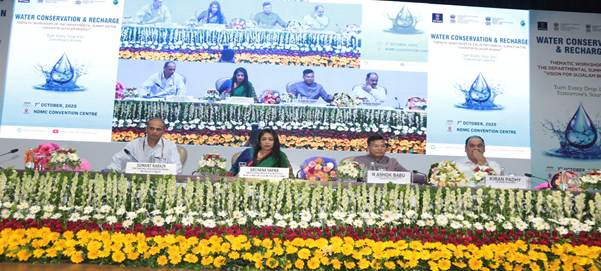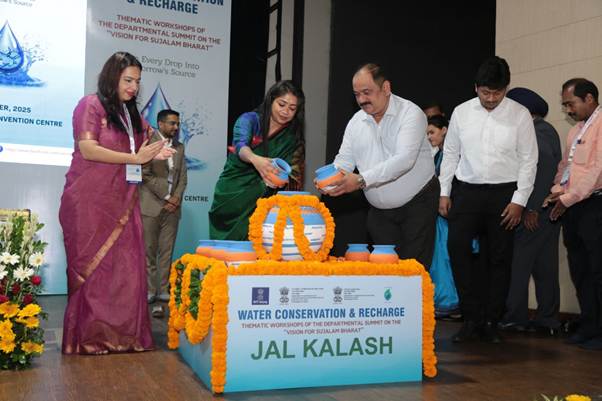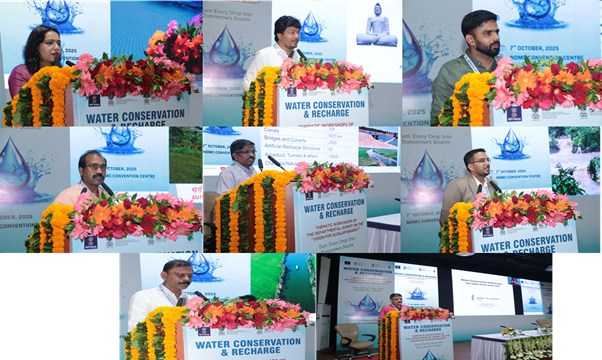Ministry of Jal Shakti
National Water Mission Organises 6th Thematic Workshop on “Water Conservation and Recharge” under Vision for Sujalam Bharat
Workshop Highlights Policy Convergence, Innovation, and Community Leadership in Water Conservation
States and Field Officers Showcase Best Practices and Success Stories in Water Recharge and Management
Focus on Integrating MGNREGA and Water Conservation to Strengthen Rural Water Security
Posted On:
07 OCT 2025 7:45PM by PIB Delhi
As part of the preparatory thematic workshops for the Departmental Summit on the Vision for Sujalam Bharat scheduled on 28–29 November 2025, the National Water Mission (NWM), under the Department of Water Resources, River Development and Ganga Rejuvenation, Ministry of Jal Shakti, successfully organised the 6th Thematic Workshop on “Water Conservation and Recharge” at the NDMC Convention Centre, New Delhi, in physical mode.

Anchored in the vision laid down by the Hon’ble Prime Minister during the 4th Conference of Chief Secretaries, which called for six Departmental Summits in 2025 to bring together officers from the Centre and States for intensive deliberations, the workshop provided a national platform to translate policy into action, promote innovation, and showcase exemplary grassroots initiatives. Coordinated by NITI Aayog and to be held under the Chairmanship of Hon’ble Union Minister of Jal Shakti, Shri C. R. Patil, the Departmental Summit will reinforce the importance of collaboration, learning, and shared ownership in achieving the Vision of Sujalam Bharat.
The Thematic workshop was graced by Ms. Archana Varma, Additional Secretary and Mission Director, NWM, along with Mr. Sumant Narain, Joint Secretary, NWM, Senior Officers of NWM and Ministry of Rural Development, State Nodal Officers, CEOs, Engineers, Scientists, and representatives from Panchayati Raj Institutions (PRIs) of Chhattisgarh, Andhra Pradesh, Madhya Pradesh, Tamil Nadu, Kerala, Maharashtra, and Gujarat, as well as members of Civil Society Organisations. Around 275 delegates from across the States and UTs participated, reflecting a broad spectrum of expertise and regional experiences in water conservation and management.

The workshop commenced with a traditional Jal Kalash ceremony, symbolising India’s timeless reverence for water as a sacred and life-sustaining resource. In her opening address, Ms. Archana Varma, AS&MD, NWM emphasised the impact of climate change on the planet and the pressing need for water conservation to ensure ecological balance. She highlighted that the workshop brought together policymakers, administrators, young officers, scientists, engineers, and civil society representatives to share their grassroots experiences, innovations, and best practices, ensuring a holistic and inclusive approach to secure India’s water future. The outcomes of the workshop were to be compiled in the form of State-Specific Notes and Feedback Notes, forming the basis for actionable strategies under the upcoming Departmental Summit, reinforcing that sustainable water management is a shared responsibility essential for safeguarding life, livelihoods, and ecosystems.
A presentation by the Joint Secretary, NWM, highlighted the outcomes of the five virtual workshops held earlier as well as today’s workshop, discussing the timeline and the importance of filling the State-Specific Notes and Feedback Notes as per the NITI Aayog guidelines. He also emphasised the latest amendment in Schedule I under MGNREGA, underlining its significance in integrating water conservation with rural employment and development. Mr. Kiran Padhy, Program Officer, Ministry of Rural Development, delivered a detailed presentation on the Mahatma Gandhi NREGS Act and its role in water conservation over the past 11 years, highlighting how the scheme’s initiatives were effectively implemented at the grassroots level to strengthen local water management and resource sustainability.

State and field-level presentations showcased innovative approaches and best practices from across the country. Ms. Suruchi Singh, CEO, Zila Panchayat, Chhattisgarh, presented a virtual clip of work in Rajnandgaon and discussed two approaches for water conservation: a scientific GIS-based method and a community-driven approach, demonstrating how technology and local participation ensured sustainable outcomes. Mr. Krishna Kumar Teja Mylavarapu, Commissioner, Rural Development & Panchayati Raj Department, Andhra Pradesh, showcased a centralised water conservation strategy, transitioned from a decentralised model, highlighting innovative local solutions, best practices, and lessons from field-level implementation. Dr. Nagarjuna B. Gonda, CEO, Zila Panchayat, Khandwa, Madhya Pradesh, highlighted over-extraction of groundwater due to inadequate monitoring, the absence of a comprehensive water information system, and presented the Jal Ghanana Samardhan Abhiyan involving 14 State departments to strengthen coordination and improve water governance. Thiru J. Jayakanthan, Secretary, and Thiru S. Sridharan, Special Secretary, Water Resources Department, Tamil Nadu, highlighted the importance of fisheries culture and traditional irrigation tanks, addressed challenges of channel connectivity and encroachment, and described district-level initiatives to clean and restore river paths. Dr. Binu Francis, Joint Managing Director, Kerala Water Authority, discussed Kerala’s water scenario, highlighting rapid runoff, recurring floods, and the importance of community-based water conservation efforts.
Mr. Shreyash Gupta, OSD, Water Resources Department, Gujarat, presented demand-side management through micro-irrigation and supply-side interventions such as barrages, weirs, and Sujalam Sufalam unlined canals, addressed salinity ingress in coastal areas, described inter-basin water transfers, and highlighted innovations such as geomembrane farm ponds initiated in 2022. Dr. Dilip Durbude, HOD, WALMI, Maharashtra, discussed the State’s vision for modern water conservation techniques, initiatives to optimise demand–supply balance, and strategies to enhance water efficiency. Mr. Vishal Narwade, CEO, Zila Parishad, Sangli, Maharashtra, highlighted the LiFE initiative, promoting citizen participation, and shared best practices across districts. Mr. Bishwadeep Ghose, Country Director, Water for People, emphasised community-centric models, innovative technologies, local behaviour-change tools, technical assistance for Government programmes, water budgeting, and the need for single-window solutions to address rural water challenges.
An interactive discussion and feedback session consolidated insights and recommendations, reaffirming participants’ commitment to strengthen policy convergence, promote source sustainability, and enhance community-driven water management initiatives. The outcomes of the workshop are expected to enrich the Departmental Summit for the Vision for Sujalam Bharat and help to frame a comprehensive roadmap for achieving national water security and resilience. The workshop underscored the Government of India’s unwavering commitment to the Hon’ble Prime Minister’s vision of Sujalam Bharat, highlighting that sustainable water management is not only a policy priority but a national responsibility requiring active participation from all citizens to conserve and rejuvenate India’s precious water resources.
*****
MAM/AK/SMP
(Release ID: 2175999)
Visitor Counter : 5373